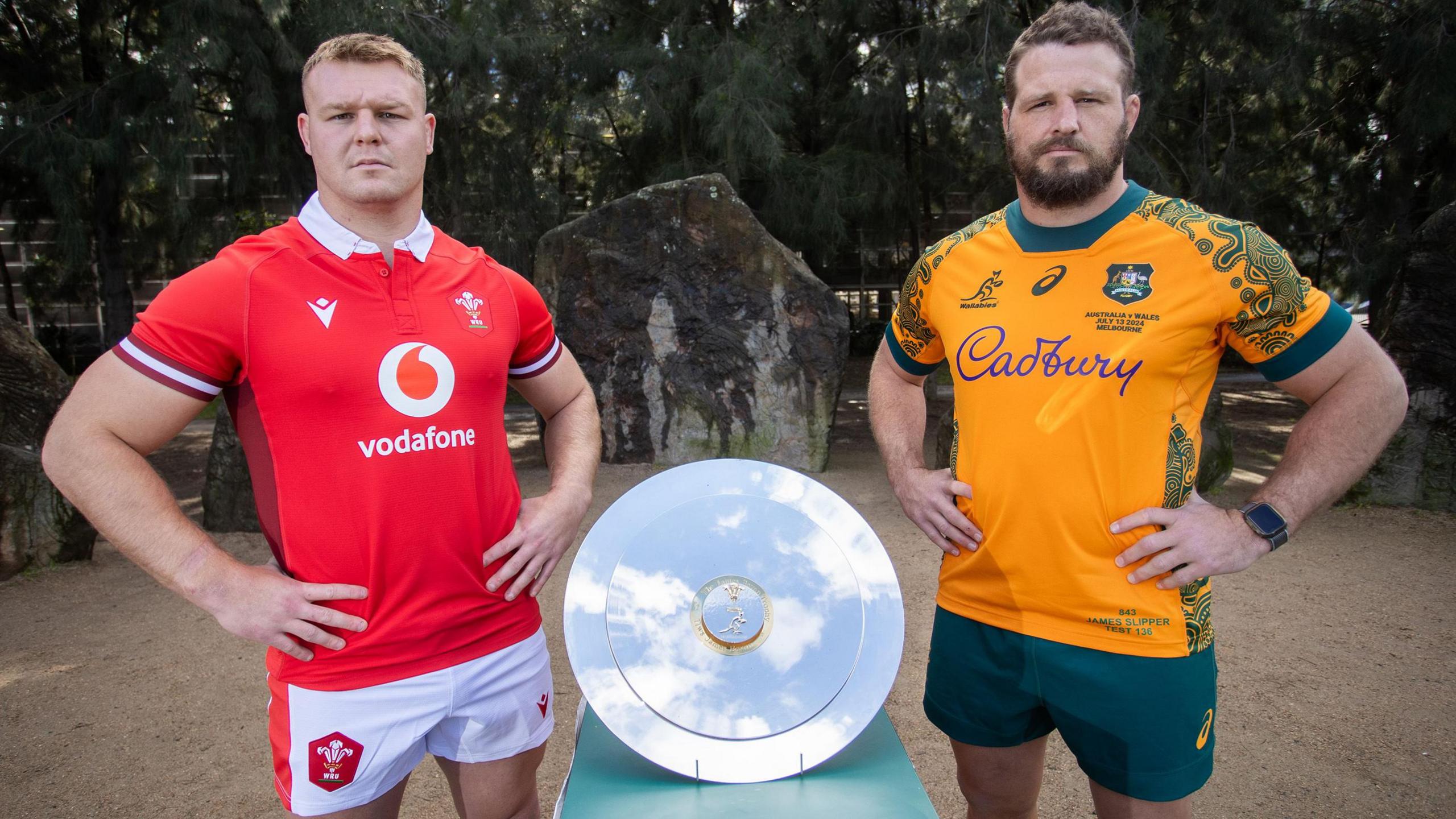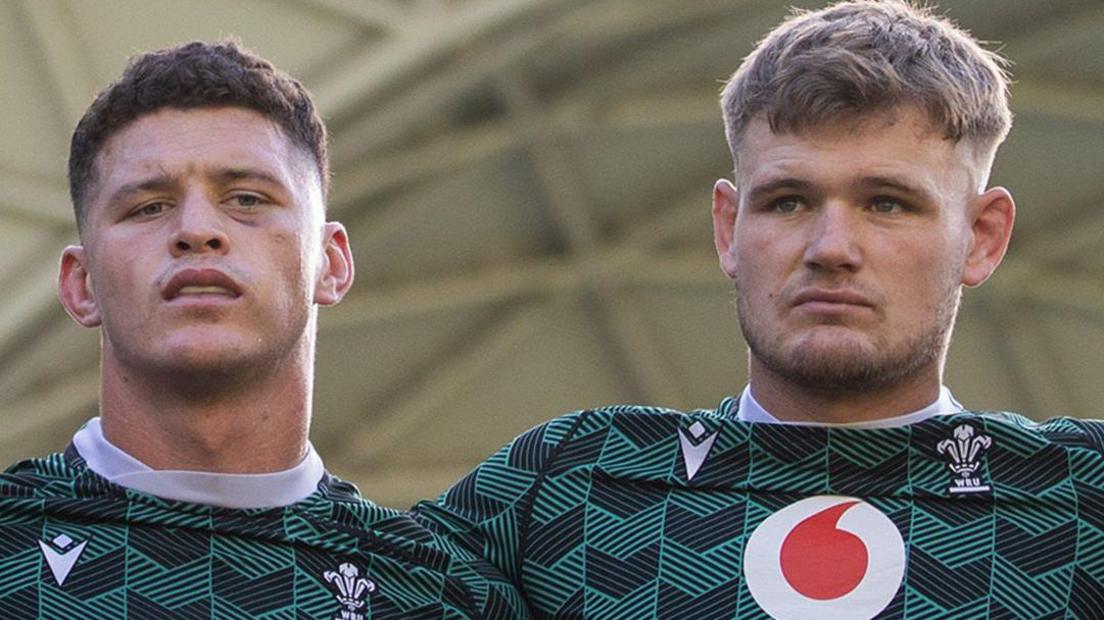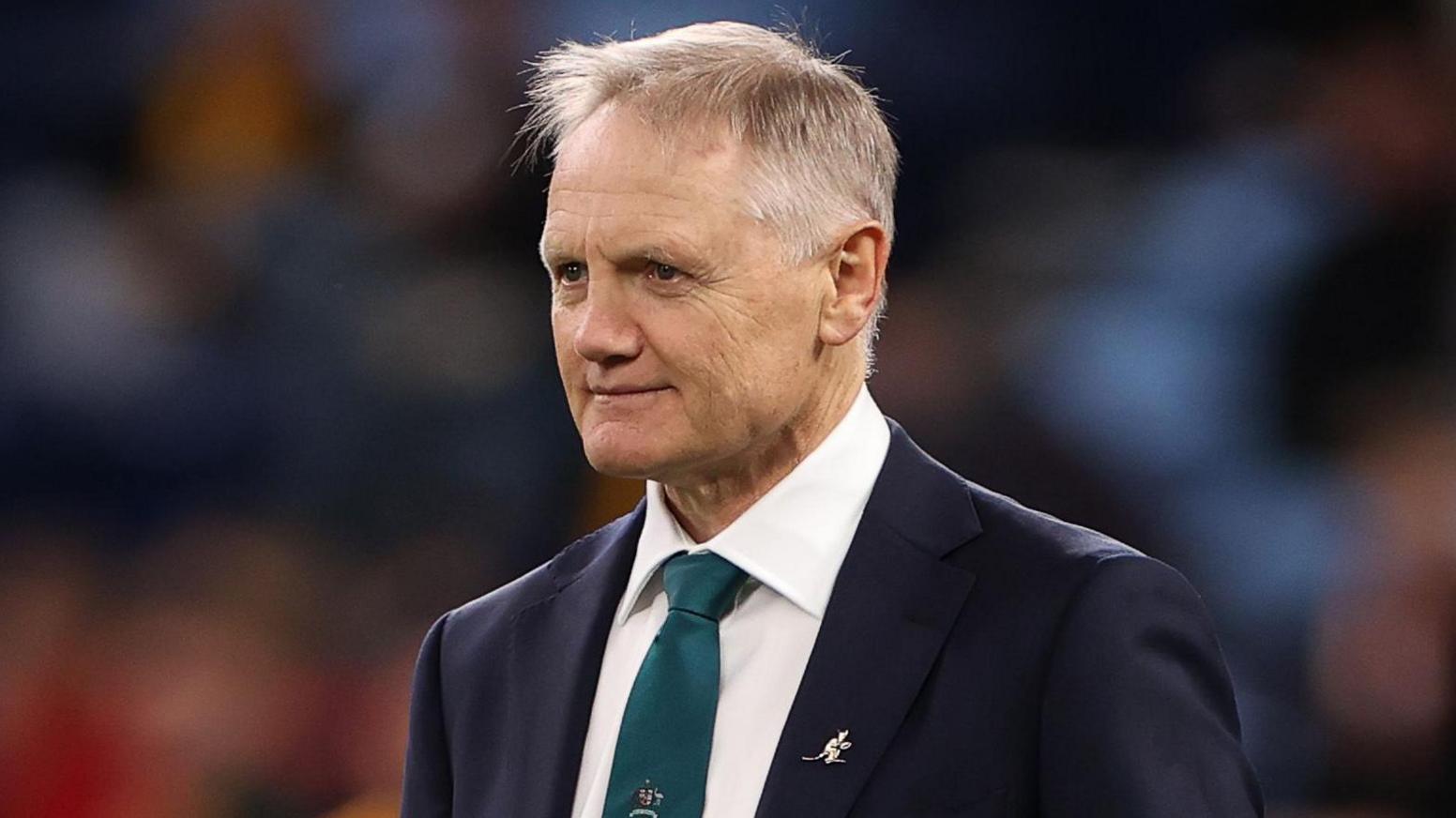Wales hope for magic in Melbourne to end losing streak

Opposing captains Dewi Lake and James Slipper are playing for the James Bevan Trophy
- Published
Men’s international friendly: Australia v Wales
Venue: AAMI Park, Melbourne Date: Saturday, 13 July Kick off: 10:45 BST
Coverage: Listen on BBC Radio Wales, Radio Cymru, 5 Sports Extra, BBC Sounds, the BBC Sport website and app, plus live text commentary, followed by report and reaction on the BBC Sport website and app.
As sporting cities go, Melbourne is pretty spectacular.
With Wales continuing a search for a first away victory against the Wallabies in 55 years, they could finally achieve that in the place often described as Australia's sporting capital.
Just walking around, you can stroll past iconic world-class venues that house both rugby codes, Australian Rules, tennis and much more.
The Melbourne Cricket Ground (MCG), while the Rod Laver arena and other Australian Open venues used for the Grand Slam tennis tournament, are just a short distance apart.
Venture a little further and the AAMI Park stadium will be found that will host the Wallabies and Wales on Saturday night.
It is also home to football sides Melbourne Victory and Melbourne FC, rugby league outfit Melbourne Storm and until recently, rugby union's Melbourne Rebels.
With all this sporting heritage, the stark contrast now is Melbourne no longer has a rugby union side after the Rebels folded last month with no current indication there will be a long-term replacement.
This is very much Aussie Rules country. It is like a religion here with half the teams in the Australian Football League (AFL) based in Melbourne and Victoria.
The sport dominates the airwaves and newspaper column inches with very little said or written on this week's rugby union international.
On Friday night, 73,000 packed into the MCG to see a regular league game between Collingwood and Geelong.
Compare that with the 25,000 expected to watch Australia and Wales 24 hours later.
Despite the disparity in interest, there remains plenty at stake for both sides as hosts Wallabies aim to wrap up the series against a touring team desperate to end a depressing losing sequence.
- Published11 July 2024
- Published12 July 2024
- Published9 July 2024
Desperate for Wales win
Second Test victory over Australia is 'non-negotiable' - Watkin
It is 21 years since Wales suffered 10 successive Test match defeats under Steve Hansen - their worst losing run since they began playing international rugby in 1881.
After a 25-16 first Test defeat in Sydney last weekend, Warren Gatland's team are moving closer to matching that sequence, and it will be nine on the bounce if Australia triumph in Melbourne.
That would represent the longest number of matches without a Test win during Gatland's association with Wales that began in 2008, ended 11 years later and resumed ahead of the 2023 Six Nations.
The coach has only won six out of 20 matches since his return and Wales have slipped to 11th in the world rankings, their lowest ever position.
Their record against Australia down under doesn't offer hope, either, with 12 consecutive defeats and no victory since 1969.
Centre Owen Watkin earlier in the week said a Wales win was "non-negotiable" and captain Dewi Lake echoed the desperation, describing potential success as "massive" for the young squad.
Finishing the international season on a high is also imperative given what is to follow.
After the Test match business on their Australia tour concludes this weekend, Wales do not play another international until Fiji arrive at Cardiff's Principality Stadium in November.
That game launches an autumn schedule also featuring Australia and world champions South Africa, before Wales embark on a testing Six Nations campaign which begins against France in Paris.
Their record in this tournament across the past three seasons is abysmal with two wins and 13 defeats and three of their games next season are away.
So things might get worse before they start to get better. Success this Saturday could change that.
Missing our Aaron

James Botham (left) and Taine Plumtree (right) are tasked with helping to fill the void left by Aaron Wainwright
Aaron Wainwright is the Wales player whose face is plastered on the billboards outside the AAMI Park stadium advertising the second Test.
Despite his pre-match billing, the talismanic Wales number eight will not feature after damaging a hamstring in the defeat in Sydney.
Amid Wales' prolonged struggle, Wainwright has shone like a beacon through one outstanding display after another.
He marked his 50th cap last weekend by producing a performance that put him head and shoulders above his team-mates, before it all went wrong.
Wainwright suffered a hamstring injury during the closing minutes ruling him out of the remainder of the tour.
A reshuffled back-row unit sees Taine Plumtree switch to number eight and James Botham starting at blind-side flanker, but losing Wainwright is a setback from which Wales might not recover.
He was the most capped forward on tour and his absence means Gatland is fielding his least experienced pack since returning for a second stint as head coach.
Australia captain James Slipper has 135 Test caps, 23 more than the entire Wales pack on Saturday who total just 112.
Wales encountered problems at the scrum and line-out during the first Test, two areas that will require considerable improvement if they are to have any chance of avoiding a series defeat.
Australia's forwards are not the most fearsome in world rugby, and Wales must at least gain parity up-front.
Second coming for Australia?

Joe Schmidt is a former Ireland head coach
Victory for Wales' hosts is just as important, albeit maybe for different reasons.
The Wallabies are seeking consecutive victories for the first time since a five-game winning streak was halted in 2021.
It would also represent a huge confidence boost to begin the Joe Schmidt era.
This follows the chaotic reign of Eddie Jones where they won just two matches in nine and were dumped out of the World Cup last year at the group stages.
The Wallabies are trying to restore credibility with the Australian public following an extended demise.
They are battling for relevancy in a sporting context against rugby league, AFL and football, commonly known as soccer in these parts.
Melbourne might not necessarily be the Wallabies' natural habitat but Australia will be hoping it will be home for a rare series this weekend.
They do not fare well in second Test contests and Wales will be hoping history repeats itself in the capital of Victoria.
Melbourne match-ups
Australia: Tom Wright; Andrew Kellaway, Josh Flook, Hunter Paisami, Filipo Daugunu; Noah Lolesio, Jake Gordon; James Slipper (capt), Matt Faessler, Taniela Tupou, Jeremy Williams, Lukhan Salakaia-Loto, Rob Valetini, Fraser McReight, Charlie Cale.
Replacements: Josh Nasser, Isaac Kailea, Allan Alaalatoa, Angus Blyth, Langi Gleeson, Nic White, Ben Donaldson, Dylan Pietsch.
Wales: Cameron Winnett; Liam Williams, Owen Watkin, Mason Grady, Rio Dyer; Ben Thomas, Ellis Bevan; Gareth Thomas, Dewi Lake (capt), Archie Griffin, Christ Tshiunza, Dafydd Jenkins, James Botham, Tommy Reffell, Taine Plumtree.
Replacements: Evan Lloyd, Kemsley Mathias, Harri O'Connor, Cory Hill, Mackenzie Martin, Kieran Hardy, Sam Costelow, Nick Tompkins.
Referee: Nika Amashukeli (GRU)
Assistant referees: Matthew Carley (RFU), Paul Williams (NZR)
TMO: Glenn Newman (NZR).